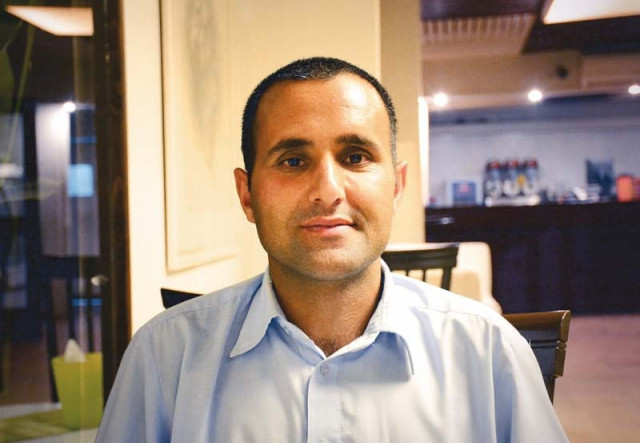The Rustam of Kalash
For the residents of Kalash, Rustam Shah is the man of the hour

Rustam Shah has dedicated his life to serving the people of Kalash. PHOTO : HUMA CHOUDHARY
Commonly referred to as Luke Rehmat, Shah was destined for greatness. Regardless of his father’s insistence that Shah assist him on the family lands, Shah’s mother moved him to a secondary school in Peshawar where he completed his matriculation and later, higher education.
 A 12-day winter sports festival was organised by the Traditional Sports Development Programme. PHOTO : HUMA CHOUDHARY
A 12-day winter sports festival was organised by the Traditional Sports Development Programme. PHOTO : HUMA CHOUDHARYDisheartened and laden with responsibility, Shah attended college intermittently and eventually, had to drop out. “It was then that I decided to try and change things for people like myself,” he says. Pakistan’s education system may have evolved in many ways but Shah believes there ought to be a way for students in remote areas to access lectures and take exams online. “Many people are passionate about studying but cannot stay away from their families due to certain difficulties,” he adds.After college, Shah decided to relocate to Islamabad to pursue a bachelor’s degree in governance and organisational sciences. Unfortunately, halfway through his degree, Shah’s sister was diagnosed with Dissociative Identity Disorder and as the only brother to seven sisters he had to return to the valley and take the reins from his parents. Desperate to complete his education, Shah tried to shift his entire family to Peshawar but was unable to do so due to financial constraints.
Upon his return to the village, Shah launched a couple of initiatives. The first was a news blog entitled The Kalasha Times which offers information regarding the region’s weather, culture and prominent tourist spots. It served as a makeshift pamphlet for the region and also reported on issues such as health and education. Soon enough, the blog took off and put Shah’s hometown on the national map. “Back in 2013, a wealthy cattleman was murdered here and hundreds of his sheep were stolen,” shares Shah. “Fortunately, as a result of our follow up, the government not only compensated his family for the loss but also gave them jobs.”
 Rustam Shah launched Ishpata News to help readers stay abreast with what is happening in Kalash. PHOTO : HUMA CHOUDHARY
Rustam Shah launched Ishpata News to help readers stay abreast with what is happening in Kalash. PHOTO : HUMA CHOUDHARYThe overwhelming responses received by his first two initiatives purred Shah on. Shortly after, he established his very own non-profit organisation called the Kalash People’s Development Network (KPDN) in the hopes to expedite the changing process. With a hint of pride and nostalgia, Shah shares how KPDN immediately launched relief efforts when the Kalash Valley was afflicted with floods earlier this year. “Floods are not new to Kalash but the recent ones were catastrophic and took many lives,” he says. “There are just 4,000 people in all of the 12 villages of Kalash. I was afraid if we do not help the people, we might become one of those races that existed once upon a time.”During the same year, Shah introduced a regional news portal called Ishpata News, a Twitter and Facebook-based news service. “The world is moving towards online media and I wanted people to stay updated on what is happening in Kalash,” says Shah. “People are now more inclined towards visuals and storytelling. So we began producing documentaries, video clips and photographs.”
 Rustam Shah teaches students at the Kalasha Academy of Computer Sciences. PHOTO : HUMA CHOUDHARY
Rustam Shah teaches students at the Kalasha Academy of Computer Sciences. PHOTO : HUMA CHOUDHARYKPDN also houses the Kalash Health and Development Programme that grants the locals regular access to basic health check-ups by way of medical camps. Other sundry projects include the Forest Conservation and Development Programme that works to curtail deforestation in the valley. Another one of Shah’s premiere ventures is the Traditional Sports Development Programme which organises a 12-day sports festival during winter every year with the aim of promoting Kalash’s traditional games, such as ghal (snow golf).Over the years, KPDN has incorporated many other progressive projects under its banner of which the Women’s Welfare Development Programme is the most prominent. Under this, Kalasha women are given vocational training and medical assistance. “We have been displaying the products made in vocational centres at exhibitions across Pakistan,” says Shah. “Some of them are sent to the UK and we are currently in talks with a university in Australia too.” Recently, Shah and his team managed to raise funds to purchase ultrasound equipment for the local hospital as well.
Other than this, Shah and KPDN are currently involved in negotiations with the National Database Registration Authority (NADRA) to issue locals official CNICs. The matter was actually resolved back in February this year but according to officials, the implementation can take up to six months or more. Adding to the variety of KPDN’s undertakings, Shah constructed a small room back in March where the Kalasha Academy of Computer Sciences (KACS) has been set up. Microsoft Word, Excel and other basic computer courses are taught here at bargain prices. “We charge a fee of Rs400,” says Shah. “Women and children are especially encouraged to join KACS.”
 The Kalash People’s Development Network team distributes clothes and food to earthquake victims. PHOTO : HUMA CHOUDHARY
The Kalash People’s Development Network team distributes clothes and food to earthquake victims. PHOTO : HUMA CHOUDHARYA trailblazer in every sense of the word, Shah has gone above and beyond to serve the people of Kalash and will continue to do so with his feet firmly on the ground.
Huma Choudhary is an Islamabad-based photographer for The Express Tribune.
She tweets @huma_choudhary
Published in The Express Tribune, Sunday Magazine, December 6th, 2015.



















COMMENTS
Comments are moderated and generally will be posted if they are on-topic and not abusive.
For more information, please see our Comments FAQ